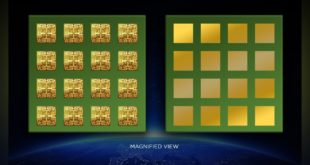Software-defined satellites (SDS) represent a transformative leap in the space industry, moving away from the traditionally rigid hardware-centric systems toward a flexible, software-driven approach. These satellites are redefining the operational paradigms of satellite communication, earth observation, and space exploration, enabling on-the-fly reconfiguration, enhanced longevity, and improved adaptability to evolving mission …
Read More »Ground Station Antenna Innovations: Supporting the “New Space” LEO Satellite Constellations Revolution
The “New Space” era has brought a seismic shift in the satellite industry, marked by the advent of Low Earth Orbit (LEO) satellite constellations designed to deliver global connectivity, real-time data, and revolutionary services. These constellations, comprising hundreds to thousands of small satellites orbiting between 300 to 3,000 kilometers above …
Read More »DARPA OTTER Program: Unlocking the Future of Space Operations with “Air-Breathing” Electric Propulsion Technologies
The United States Department of Defense is pioneering a transformative new approach to satellite propulsion with the DARPA OTTER program, which seeks to unlock the future of space operations through innovative “air-breathing” electric propulsion systems. These technologies are specifically designed to support operations in Very Low Earth Orbit (VLEO) – …
Read More »Modular Propulsion: AFRL’s Vision for Small Satellites
The Air Force Research Laboratory (AFRL) is spearheading a transformative effort to integrate modular propulsion systems into small satellite architectures. This initiative, termed MODPROP, seeks to standardize interfaces between satellite buses and propulsion units, enabling rapid integration, upgrades, and mission flexibility. By developing this modular approach, AFRL aims to streamline …
Read More »India’s Thriving Space Sector: A Rising Star in the Global Space Business
The Surprising Striver in the World’s Space Business When India launched its first rocket in 1963, it was a modest attempt by a developing country to engage in cutting-edge technology. Fast forward to today, and India has emerged as a significant player in the global space industry. What started with …
Read More »China’s Far Side Lunar Odyssey: From Chang’e-4 to Chang’e-6
Introduction China has firmly established itself as the pioneer of far side lunar exploration—the only nation to have successfully landed on the Moon’s hidden hemisphere. This remarkable journey began with the historic Chang’e-4 mission, which overcame unprecedented challenges to unlock the mysteries of a lunar realm forever shrouded from Earth’s …
Read More »Robotics in Water Ice Drilling: The Quest for Subsurface Ice on Mars
Exploring Mars is more than just a scientific endeavor—it’s a journey toward establishing a sustainable human presence on the Red Planet. Essential resources such as water and oxygen, both for survival and fuel, are critical to this mission. Among the most promising solutions is harvesting the Martian subsurface ice, which …
Read More »The Rotating detonation rocket engine (RDRE): How it Works and What it Means for Space Travel
Space travel is an endeavor that requires highly efficient propulsion systems. Traditional rocket engines, while powerful, consume vast amounts of fuel and are often bulky, complex, and expensive to build. However, a new technology is emerging that could significantly change how rockets operate, making them more fuel-efficient, lighter, and potentially …
Read More »AFRL’s Contributions to Space Security: Advancements and Future Directions
The Air Force Research Laboratory (AFRL) has been at the forefront of space security, consistently developing innovative technologies and programs designed to address the evolving challenges in the space domain. As the U.S. navigates the complexities of great power competition, AFRL’s commitment to advancing space security remains steadfast. The upcoming …
Read More »Plasma Propulsion: The Future of Space Travel
As humanity continues to explore deeper into the cosmos, traditional chemical propulsion systems are increasingly showing their limitations. These systems, which have propelled spacecraft since the dawn of the space age, are bulky, inefficient for long-duration missions, and require vast amounts of fuel. In contrast, plasma propulsion—an advanced form of …
Read More » International Defense Security & Technology Your trusted Source for News, Research and Analysis
International Defense Security & Technology Your trusted Source for News, Research and Analysis

